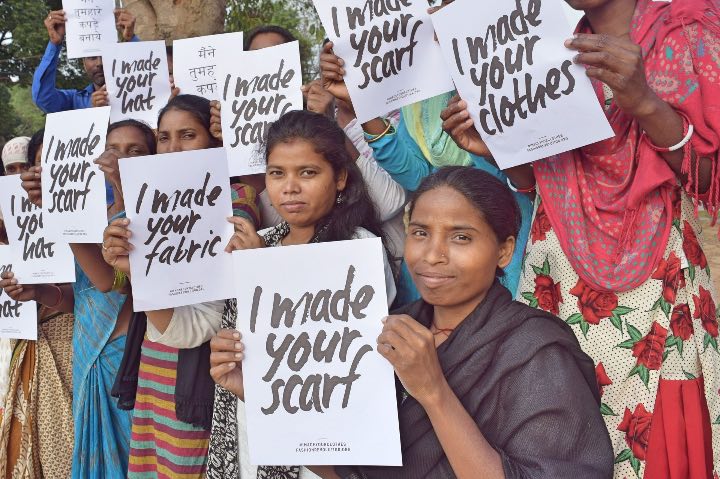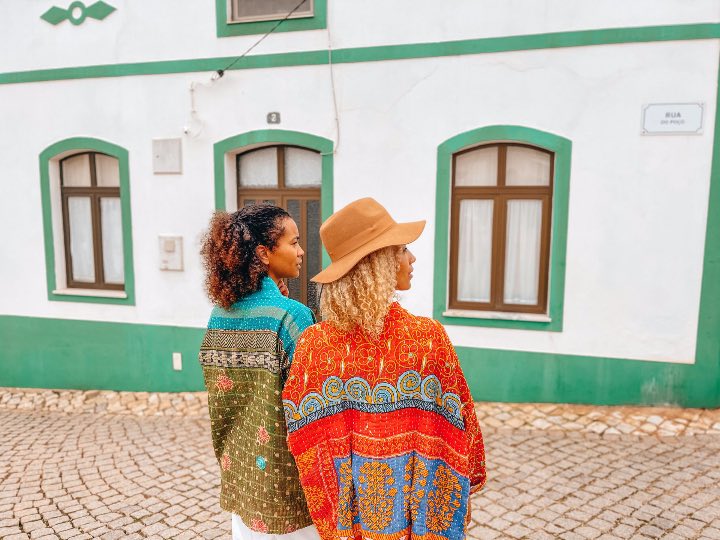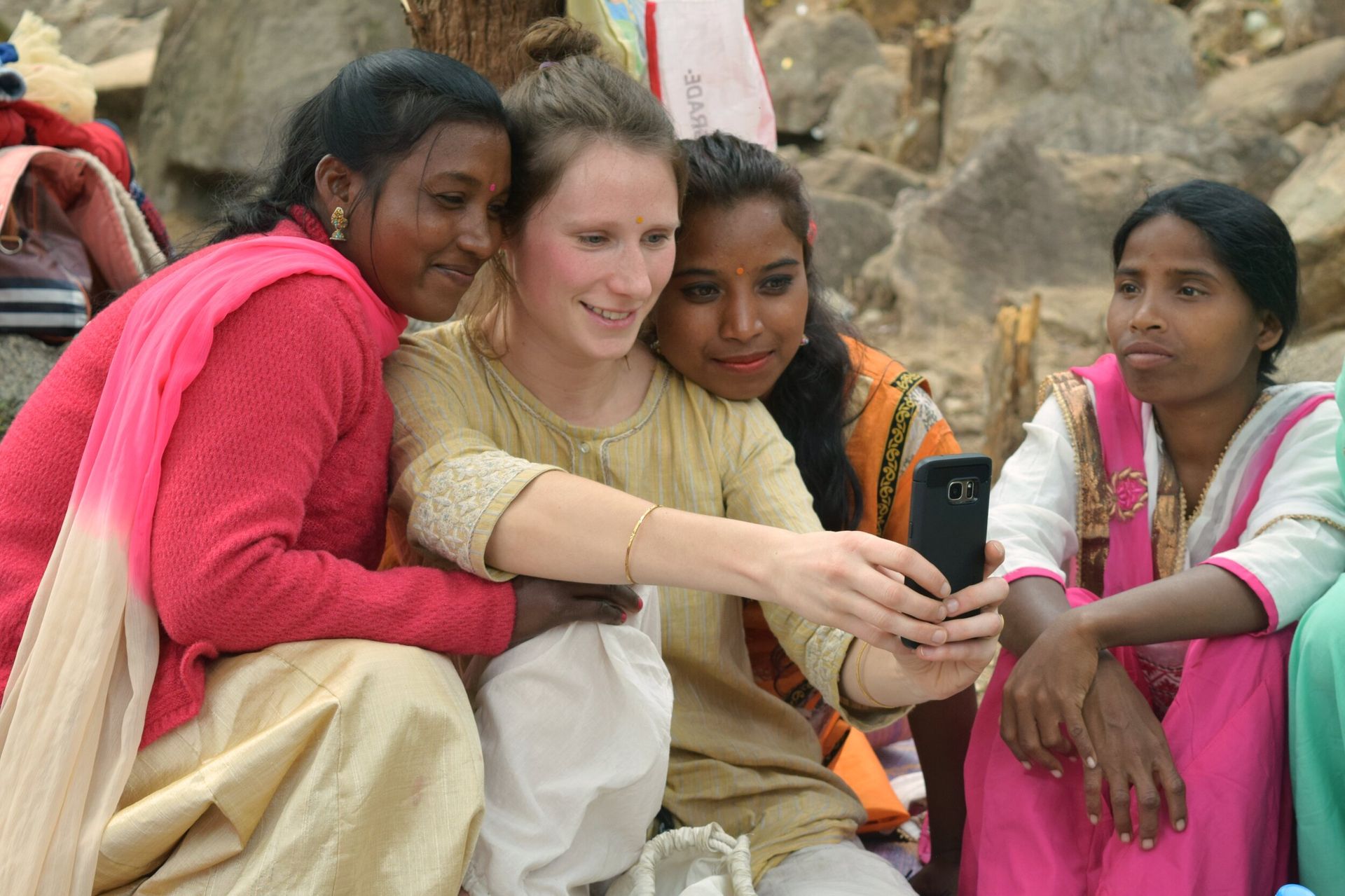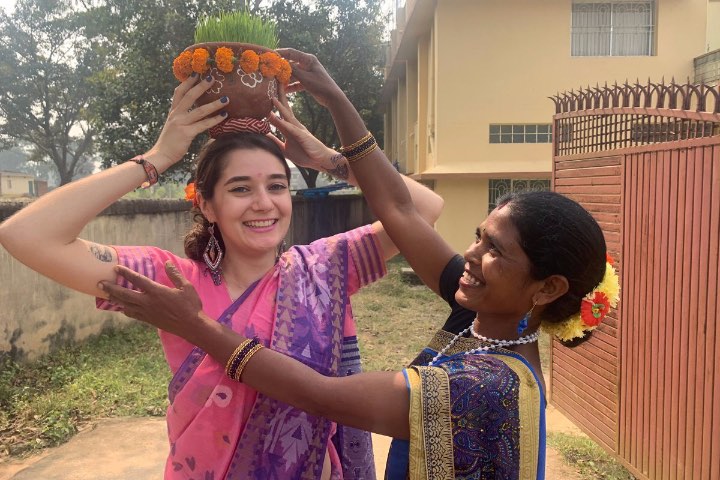The article below is a translation of the original tekst pubished in Dutch on 24/04/2021 written by Lotte Philipsen for Knack Weekend
Lotte Philipsen Journalist KnackWeekend.be
During Fashion Revolution Week, we ask ourselves who makes our clothes. In many cases, this question leads to harrowing stories of exploitation, but the Belgian social enterprise Solid, shows that fashion and textiles can also be empowering. Get to know the female artisans of Solid in India better.
The journey that clothes have made before they end up in our wardrobes is often long and not always rosy. Clothing production in Europe is no longer commonplace since the globalisation and what happens behind the scenes in the textile workshops in the South is a mystery to many. Every year, during Fashion Revolution Week, we reflect on the origin of clothing and ask ourselves whether it can be done better, more fairly and more sustainably.
That was exactly the issue they wanted to solve when they started their Indian handicraft workshop five years ago, says Indra Cox of Solid during a Zoom call from Ranchi: 'We want to empower women first and foremost, so we started looking for a way to give them honest and valuable work.'
Empowerment
It all started with an inspiring conversation between Solid founder Lyn Verelst and sister Jeanne Devos, who dedicated her life to women's rights in India and started the National Domestic Workers Movement. Domestic workers in India are often women with very few labour rights. They suffer a lot of abuse and exploitation. We wanted to help this vulnerable group by offering an alternative,' explains Indra.
Ranchi is located in northeast India, in the state of Jharkhand, India's second poorest state. Jharkhand means 'the land of forests' in the local language. It is a tribal region, where many of India's original inhabitants live. They are an oppressed group. The underprivileged, tribal women often own a piece of land on which they work. Owning land is the strength of the tribal community, but this is often compromised as land rights are often violated. Fortunately, there are many organisations working to defend these rights.
When women from rural areas in Ranchi migrate to larger cities to work as domestic workers, they lose their land and social safety net, Indra points out. As domestic workers, they often end up in inhuman situations, working like modern-day slaves. Hence our choice for local employment, close to their land and family. We are not located in the rural area near Ranchi for economic benefits, but to create opportunities.
Social pressure
Being born a woman in this community has many disadvantages. No one will say it explicitly, but in this region, giving birth to a son is a blessing and giving birth to a daughter is a burden,' says Indra. Girls are married off and their job is to take care of their in-laws. As soon as they are married, they move to their husbands' homes and are expected to have children as soon as possible, who will in turn take care of their parents or parents-in-law. Everything they own, the girls take with them. They are also informally given a dowry. In the case of poor families, it is therefore logical that parents invest more in sons because they stay with them and will take care of them. Sending their daughters to school for less time is simply a survival strategy.'
These conservative family expectations often make girls and women feel worthless and unwanted. They experience little freedom and are weighed down by social pressure. Female empowerment is not only about an income, but also promoting self-confidence,' explains Indra. We want to show them that they are valuable and that their contribution to society is important.'
Chasing dreams
Although the traditional pattern is difficult to break, Indra sees how they have made progress over the past five years. I am very happy that afteThe kimonos, made of kantha-textile © Solid- Lieve and Mieke Vandenwegher a while the women who work with us realise that they can dream and choose their own path. They also tell me that they will raise their daughters differently, now that they have experienced that there are opportunities. By creating employment for women, you impact the whole community.'
Most of the women who start at Solid in Ranchi have no prior experience in the textile sector. The master weavers are traditionally men. In the weaving villages, women usually take on underpaid or even unpaid work. It is therefore assumed that women are less able to weave, but it is mainly a matter of a lack of training. When we hire new women, they are first trained in the various techniques,' says Indra. A loom is a huge, cumbersome wooden machine, for which you need a lot of technical knowledge. Many of our women can now read technical manuals and set up a loom from start to finish. This is unique in this region and is a great advantage, and the women are rightly very proud of it.
Women can combine their job at Solid with their own household jobs and cultivation of their land. Indra explains that this flexibility is a necessity: 'They often do not have running water and therefore need to have time to walk to the well. Most households also do not have a refrigerator, so fresh food has to be made every day. We don't want to impose our way of working, as we do in Belgium, on them. We also have a crèche at work, so the little ones can come along.'
Positive impact for the whole family
We want to work productively, of course, but we talk to our employees about what is manageable . Women have an important social role in India, we don't want to take that away from them. So we discuss together where the boundaries lie and look for a way that is respectful of their culture but also empowering.' Change never happens by itself, not even in Ranchi. Men are not always eager for their women to do this kind of work," says Indra. But it is beautiful to see how many women persevere and make decisions for their own happiness and independence. In the end, their job turns out to be positive for the whole family. They are happier, have a stable income, the children have food and can go to school and the women can still participate in agriculture.'
Diversity and inclusion
What Solid certainly does not want to do is impose a strictly Western perspective. I have learnt a lot from this work', says Indra. The glasses through which we as Westerners look at fashion and business are very much linked to individualism. It has become so extreme that we think our well-being can be separated from the well-being of the planet and the community. Here, they see it differently and realise very well that we are part of nature. Everything is connected. That is why it is so important to promote diversity and inclusion, also in the business world. By integrating more female and non-Western perspectives, we can make the way we do business better and fairer.'
In the beginning, the women assumed that they had to throw away their own values and culture in order to become economically empowered. That way of working did not go so well, since they are not used to being approached as individuals and often end up in a hierarchical system. The sense of community is their strength, not their weakness. Fortunately, together we have managed to see that this quality is very valuable. Within a company, it is important to want the best for everyone and not to be jealous of your colleagues. Together you really are stronger," concludes Indra.
Get to know the craftswomen of Solid in India better through their testimonials
Sisiliya Tuti (41): craftswoman in crochet and Kantha since April 2017
Sisiliya grew up in poverty. When her father died, she could no longer go to school because she had to help provide for the family. Before she started working at Solid, she worked as a domestic helper and in the construction sector: laborious work for poor pay. At Solid, Sisiliya works as a crocheter and Kantha embroiderer.
When I started, I had no knowledge of crochet and sewing. I was afraid I wouldn't be able to do it well enough. At one point, there was an order for a pouffe and a cushion that I didn't dare start because it looked so difficult. So I asked Sunita to give me another task. She encouraged me: "You will be able to do it. Just try." In the beginning, I was slower than the rest, but now I have caught up and can do my tasks. I got more self-confidence and thought, "If the others can do it, so can I." By continuing to practise, I eventually succeeded.'
A great memory of my work here at Solid is when Soni and I celebrated our birthdays together. It was right after I got my first paycheck and we bought a big cake and other goodies together. It was great fun to celebrate with the whole Solid family. I felt very happy.'
My colleagues are very helpful. They are nice and teach me all kinds of things and I, in turn, also teach them what I know. I am grateful for that. And I am also very grateful to the people from Solid who give me and the other women the opportunity to work here and earn our own money. I hope that the company will grow so that more women can work here.
Anna Lakra (34): craftswoman in crochet and Kantha since April 2017
 Anna grew up with 2 sisters, 3 brothers and her mother. Her father died when she was ten, which was very hard on the family, both financially and emotionally. She married when she was 23.
Anna grew up with 2 sisters, 3 brothers and her mother. Her father died when she was ten, which was very hard on the family, both financially and emotionally. She married when she was 23.
I first heard about Solid at a wedding party. I hesitated to apply because I was very insecure and I thought they would never select me because I had no experience. In the end, the application went very well and I was allowed to start the three-month training.
Before I worked for Solid I was thin and weak. Now I am healthy and strong. My children also ask me to keep working at Solid because they see that the job is good for me. I am much less sick than I used to be when I worked in construction. Another advantage of the job is that it is close to my home. So I can go to the parent meetings and do the housework. At my previous jobs, this was impossible to combine. I am happy that I can be a good mother and work. That balance is important to me.
At the moment my husband doesn't have a job, but he does prepare the evening meal. Our sons are 19 and 17 and go to school. I can pay for everything myself, even the school fees for my sons. That makes me very happy. Before, we were always stressing about our financial situation, but now I am much more relaxed.''
When I had just started at Solid, I built my own well. I was allowed to start working later, so I could combine it. In the meantime, I have also saved enough to build my own house. Normally, the construction would have started in March 2020, but due to the corona crisis, it has been postponed. I believe we will be able to start after the crisis.
At Solid, I learned that you shouldn't live in the past, but look to the future. I am stronger now. I am very happy that new women can also start at Solid. Sharing the opportunities and facilities makes me happy.’